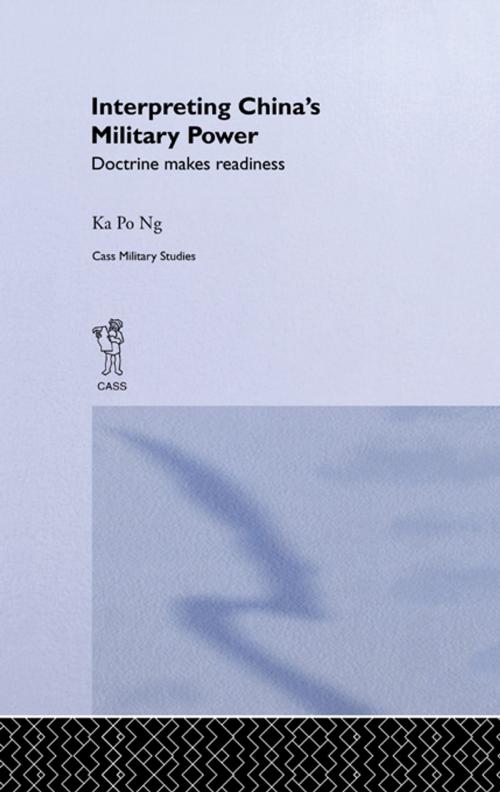Interpreting China's Military Power
Doctrine Makes Readiness
Nonfiction, History, Reference, Military| Author: | Ka Po Ng | ISBN: | 9781135769246 |
| Publisher: | Taylor and Francis | Publication: | August 9, 2005 |
| Imprint: | Routledge | Language: | English |
| Author: | Ka Po Ng |
| ISBN: | 9781135769246 |
| Publisher: | Taylor and Francis |
| Publication: | August 9, 2005 |
| Imprint: | Routledge |
| Language: | English |
Although inter-state tensions have generally been easing after the Cold War, military power remains a dominant factor in Asian regional politics. As China, operating the world's largest army, grows stronger, there are ongoing debates over the implications for Asia's regional security. This book argues that it is imperative to look beyond the empirical observations and conventional materialist reading of Chinese military development to understand its dynamics and directions in doctrinal terms and put it in a readiness context for evaluation. Military doctrine has long been under-studied and is often treated as a subject separate from force development. But, as this study contends, this factor is necessary for interpreting the making and purposes of China's military power because it forms the intellectual foundation of military structural and hardware development. When loaded with political rhetoric, it also communicates to us the intended uses of the military power. The role of doctrine is reinforced in the context of military readiness, which defines what for and how the army is getting ready. Force development is evaluated in structural, operational and directional terms.
The importance of this analytical framework based on military doctrine and readiness is demonstrated in a survey of the evolutionof Chinese military doctrine and force development. As the Chinese People's Liberation Army has continued to adjust its military structure and operation to follow the doctrinal lead, its switches between the doctines of local war and total war have seen corresponding changes to the emphasis between operational and structural readiness.
Although inter-state tensions have generally been easing after the Cold War, military power remains a dominant factor in Asian regional politics. As China, operating the world's largest army, grows stronger, there are ongoing debates over the implications for Asia's regional security. This book argues that it is imperative to look beyond the empirical observations and conventional materialist reading of Chinese military development to understand its dynamics and directions in doctrinal terms and put it in a readiness context for evaluation. Military doctrine has long been under-studied and is often treated as a subject separate from force development. But, as this study contends, this factor is necessary for interpreting the making and purposes of China's military power because it forms the intellectual foundation of military structural and hardware development. When loaded with political rhetoric, it also communicates to us the intended uses of the military power. The role of doctrine is reinforced in the context of military readiness, which defines what for and how the army is getting ready. Force development is evaluated in structural, operational and directional terms.
The importance of this analytical framework based on military doctrine and readiness is demonstrated in a survey of the evolutionof Chinese military doctrine and force development. As the Chinese People's Liberation Army has continued to adjust its military structure and operation to follow the doctrinal lead, its switches between the doctines of local war and total war have seen corresponding changes to the emphasis between operational and structural readiness.















